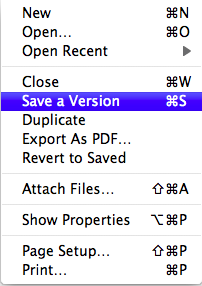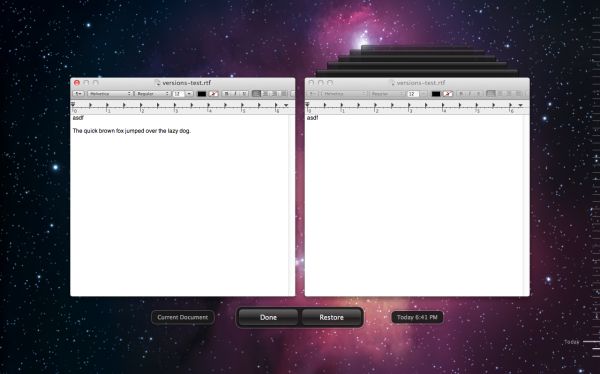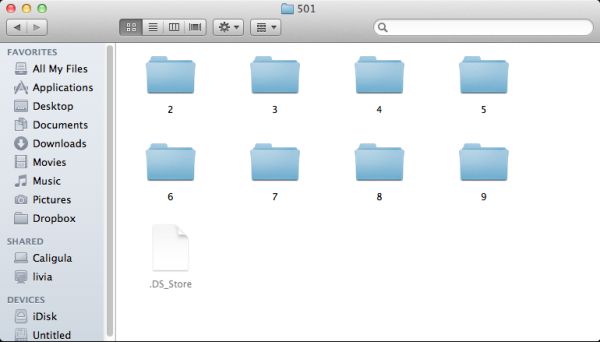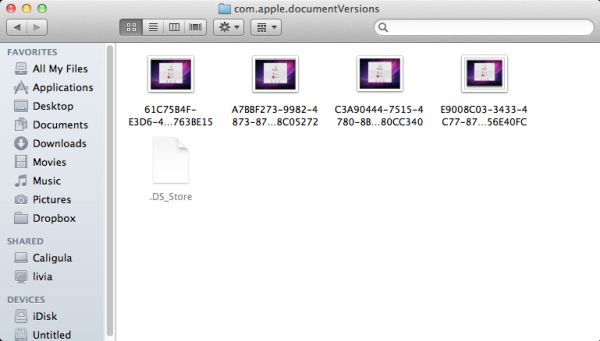Back to the Mac: OS X 10.7 Lion Review
by Andrew Cunningham, Kristian Vättö & Anand Lal Shimpi on July 20, 2011 8:30 AM ESTAnother heavily-publicized feature of Lion is Versions, which keeps older copies of files as you save new ones and allows you to go back to previous copies to compare, restore, and copy-paste things you didn't mean to change. Unlike Resume, applications will need to be changed to support this functionality.
In a Versions-supporting program like TextEdit or Preview, you'll notice that the normal "Save" or command-S function is now called "Save a Version" instead. There's no special command you need to know to save Versions - if the app supports it, this happens automatically.

When you want to go back and look at your previous versions, select the Revert to Saved option in the menu to open the Versions interface.
You'll be presented with a very Time Machine-esque interface that will let you browse through your previously saved copies, compare them to your working copy, and restore an old copy to be your new working copy.
So how does this work? Versions stores its data at the root of your OS volume in a hidden and locked-down folder called 'DocumentRevisions-V100". Files are saved using the UID for each user account (the UID is a unique number assigned to each user account at time of creation, and is normally hidden from the user. All UNIX and UNIX-like operating systems use UIDs for user accounts). In the screenshot below, "501" is my account's UID, and the numbered folders each correspond to an individual file.
Drill down into any of the folders stored here, and you can see where OS X is keeping the older copies of your files.
Whenever you delete the source file, all stored versions of it are also deleted, so don't try to use Versions to recover accidentally deleted files - that's not what it's for, and you'll still need to be careful about what you do and don't keep.
It's not immediately obvious how many files OS X will store versions for, or how much disk space this hidden folder will take up if you let it, but disk space seems to be the limitation here - I was able to save 63 versions of an individual file without overwriting any older copies. Given Apple's desire to hide the seams and inner workings of OS X from regular users, I feel confident in saying that (1) OS X won't allow this system folder to take up so much space that it impacts OS performance or storage of regular files, and (2) there's probably some sort of safeguard present that will eventually begin deleting older versions of things as disk space runs low. This is how Time Machine works, and Versions is obviously taking cues from that feature.













106 Comments
View All Comments
parlour - Monday, July 25, 2011 - link
The revenue includes all the money that is payed to developers, music labels and media companies. Apple keeps no more than 30% (probably quite a bit less) of it.bwmccann - Wednesday, July 20, 2011 - link
Just started playing it a month ago and my entire family is hooked!ltcommanderdata - Wednesday, July 20, 2011 - link
I don't suppose you could compare OpenCL performance between Snow Leopard, Lion, and Windows 7? Given the increasing emphasis Apple is putting in OpenCL and the requirement for it in Final Cut Pro X and no doubt future iLife and pro apps, it'll be good to see how their latest implementation stacks up in performance rather than just feature-set (Lion bumps things to OpenCL 1.1 from 1.0 in Snow Leopard.)jensend - Wednesday, July 20, 2011 - link
The claim that GPL3 "prohibits inclusion in retail products" is an outright lie. It's not just an inaccuracy- there's no way anybody who was even slightly informed about these things would think that; the ability to sell the software is one of the basic freedoms the GPL has always been about protecting.It is true that Apple refuses to use GPL3 software. The only reason I can think of for this is that the GPL3 says that if you distribute software under the GPL3 you implicitly grant patent licenses to everybody for any patents you may have which cover the software. Apple's wish to use its portfolio of obvious and non-innovative patents as a weapon to destroy its competitors conflicts with this.
Confusador - Thursday, July 21, 2011 - link
Came here to say this and you've got it covered. This is an unusual case of blatantly false information on AT, you guys are usually much better informed than this.batmang - Wednesday, July 20, 2011 - link
I'm a little surprised that Anand didn't include any gaming benchmarks in this OS review just for simple comparison. Overall though, fantastic review and I'll certainly be upgrading to Lion in a week or so. I'm waiting to see if any oddball bugs arise before taking the plunge. Thanks for the review Anand.Kristian Vättö - Wednesday, July 20, 2011 - link
I think he was going to but didn't have time (we wanted to get this out right when Lion went live). I don't know about his plans but maybe he will update this with GPU performance or do a separate article about that.Gigantopithecus - Wednesday, July 20, 2011 - link
"Business customers can get Lion for $29.99 per copy in units of 20 or more, and educational institutions can buy it along with the latest iLife and iWork upgrades for $39 in quantities of 25 or higher. Especially when compared to Microsoft's complicated and expensive Windows licensing, these simple, low and clearly defined upgrade prices are extremely welcome."I can't speak for business customers, but pricing for higher ed institutions is extremely variable for MS software.
To wit, at the University of Wisconsin, our tech store offers zero discounts compared to retail on all Apple software, whereas both W7 Pro & Enterprise are $10 for one license and $25 for a fiver. At the University of Michigan, Apple OS software is similarly sold at retail with no discount, while W7 Pro is $19. Michigan State offers no discounts on both OS X and W7 vs retail. Indiana University sells OS X for retail & W7 for $20.
I'm not familiar with direct-from-Apple educational pricing, but if you go to actual universities' actual computer stores, MS software is sold at enormous discounts at 3 of the 4 Big Ten campuses I'm familiar with. Saying Apple offers lower OS pricing than MS to higher ed customers is flat out inaccurate.
mrd0 - Wednesday, July 20, 2011 - link
Same at Washburn University's School of Law...I purchased the full enterprise Office 7 and then 10 for $9.95, and Windows 7 for $29.95. Apple software is not discounted.SmCaudata - Wednesday, July 20, 2011 - link
Minnesota is Free to download or the cost of printed media ($8). This was when I was there at least.At Colorado both Windows and Office are also free to download. Before that (last year) they participated in the $29 usage option for office.
The fact is Windows/Office is really only expensive if you are building your own computers and installing your own OS. Even then you can get it rather cheap and the money you save more than makes up for the extra $50 Windows 7 runs over this. Also this only updates on SnowLeopard. If you didn't have that upgrade it will cost you more. Win7 upgrades back to XP, correct?